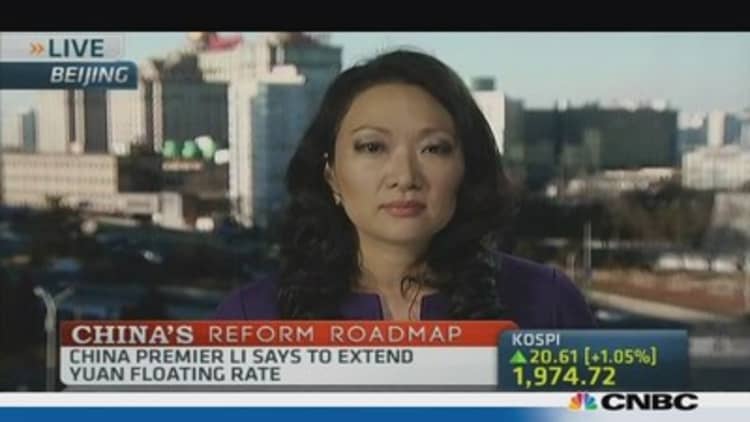
China has set its gross domestic product (GDP) growth target for 2014 at 7.5 percent, the same as for 2013, and will keep consumer inflation at 3.5 percent, Chinese Premier Li Keqiang said on Wednesday.
His comments come as the country began its annual meeting of parliament, the National People's Congress.
"The work report reads as business as usual, it's a steady state-report," said Geoff Raby, Chairman and CEO of business advisory firm Geoff Raby & Associates. "The growth report was what they did last year and the year before, so if you track them over the years, you will see a continuity in policy. The leadership is sending a clear message that it's comfortable at where they are at present."
Li also said the government would push forward reform of the yuan exchange rate. Convertibility of the yuan on the capital account would be brought forward, he added. Broad M2 money supply growth would be kept at 13 percent.
(Read more: Will a weaker yuanheighten China's property risks?)
The government also plans for a 15.3 trillion yuan ($2.5 trillion) budget in 2014, which would produce a deficit of about 2.1 percent of GDP, unchanged from the actual shortfall in 2013, the finance ministry said.
The country's top economic planning agency said in a report to parliament that the government will target 17.5 percent annual growth in fixed-asset investment and 14.5 percent in retail sales growth in 2014.
Key points in Li's speech:
- 2014 growth target set at around 7.5%
- 2014 CPI target set at around 3.5%
- Total trade to increase 7.5% in 2014
- 2014 budget deficit seen at 2.1% of GDP
- China to make domestic demand its main growth engine
- China to continue with exchange rate reform
- China to extend yuan floating rate
- China's military spending to increase by 12.2%
(Read more: China minting billionaires at 'phenomenal' rate)
The world's second-largest economy grew 7.7 percent in 2013, steady from the previous year and fractionally above market expectations of 7.6 percent, which would have been the slowest since 1999.
Chinese authorities have been largely expected to tolerate slower growth as the country embarks on reforms to rebalance its economy.
According to Dariusz Kowalczyk at Credit Agricole, it is not healthy for China to keep economic growth rate at an elevated level.
"It is disadvantageous in the long run because it can only be achieved by higher deficits and a further build-up of leverage," Kowalczyk wrote in a note.
(Read more: China is now cheaper than Turkey)
"It would be much better to set a goal closer to the 6 percent estimate of potential growth we have, say at 7 percent, and reduce deficits and leverage. Not doing so means Beijing is unprepared to focus on financial stability at the expense of growth, which raises the risks of financial instability going forward," he added.
Paul Krake, founder of View from the Peak: Macro Strategies, said that by setting the growth target unchanged from the previous year, Beijing is sending a confusing message.
"If you got the same growth target as last year, where's your reform process?" he told CNBC. "They can either reform or grow the same as last year, they can't do both, because domestic consumption is not big enough to pick up the slack of declining fixed asset investment. That's the inherent problem."
(Read more: How big is China's economy, really?)
But Raby said that for China, the trade off relationship between reforms and growth isn't that straight forward.
"It seems to be the assumption that if you want reform, you will have to have lower growth. I think there's a lot of reform to be done and a lot of it was laid out in the third party plan statement last November. This work report which is consistent with economic growth. i don't buy this one to one trade off in this growth," he said.
- Reuters contributed to this report.

